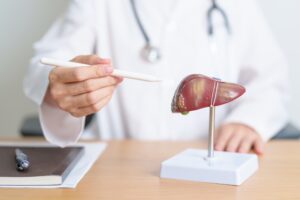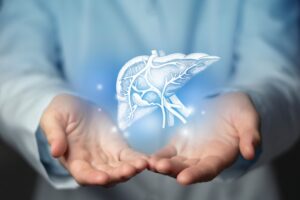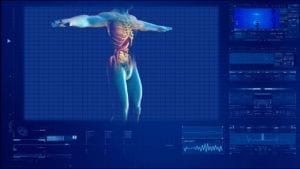Nonalcoholic Steatohepatitis (NASH)
What is nonalcoholic steatohepatitis (NASH)?
Nonalcoholic steatohepatitis (NASH) is a disease where fat build-up in the liver causes inflammation and liver damage in non-drinkers or people who drink very little. It is not always symptomatic, and it does not always get worse. However, NASH can end up causing scar tissue which prevents the liver from functioning. It mimics the liver disease that affects long-term heavy drinkers.
NASH affects up to 25% of people in the United States. Although it affects those with no risk factors, it is more likely to develop in patients who are overweight, with diabetes and high cholesterol.
What are the symptoms of nonalcoholic steatohepatitis (NASH)?
Nonalcoholic steatohepatitis (NASH) symptoms include:
- Weakness
- Fatigue
- Weight loss
- Nausea/vomiting
- Appetite loss
- Jaundice
- Itching
- Mental confusion
- Abdominal pain
- Leg/abdomen swelling
- Spider-like blood vessels
What causes nonalcoholic steatohepatitis (NASH)?
The cause of NASH is debated. It could be an inherited condition, or there could be environmental factors that trigger the inflammation present in the disease. However, there are risk factors for liver disease in general that include:
- Obesity
- Type 2 diabetes
- High cholesterol
- Metabolic syndrome
How is nonalcoholic steatohepatitis (NASH) diagnosed?
NASH is diagnosed through initial blood tests to look for an increased liver enzyme count, then other tests to rule out other potential conditions, and finally confirmed with an ultrasound.
What are the treatments for nonalcoholic steatohepatitis (NASH)?
NASH treatment options include:
- Weight loss
- Lower cholesterol
- Alcohol avoidance
- Diabetes control
- Healthy diet/exercise
Where can I find out more about nonalcoholic steatohepatitis (NASH)?
Nonalcoholic Steatohepatitis (NASH) Articles

First Treatment Approved for Nonalcoholic Steatohepatitis Liver Scarring

Updated Study Data Suggests Efruxifermin Benefits Stage 2 or 3 MASH

Investigational Therapy Could be Top of the Line Treatment for MASH


Targeting the Bile Acid-Triggered Pathways Could be Key for Pediatric NASH









